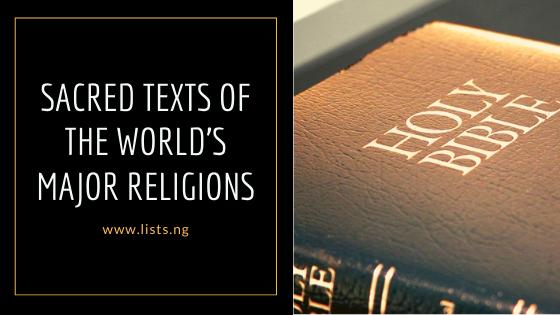Every religious group process sacred texts that instilling law, character and spirituality, and sometimes serve as a direction or guideline to the practice of said religion. These texts have gained credibility and authority through generations of use, ratification and enforcement. They differ from literary texts as they are often in form of compilation or discussion of beliefs, mythologies, ritual practices, commandments or laws, and so on. Below are sacred texts of 7 major world religions.
The Tripiṭaka (Buddhism)
The Tripiṭaka is the traditional term for the Buddhist scriptures. The Tripiṭaka was composed between about 550 BCE and about the start of the common era, likely written down for the first time in the 1st century BCE. The content of the sacred book includes dress code, certain dietary rules to be followed as well as the teachings of the Buddha.
The Bible (Christianity)
The Bible, also known as the word of God by Christians, is a collection of sacred texts or scriptures. The Bible is believed to have been written over a span of 1500 years, by 40 writers and its content are considered to be a product of divine inspiration and a record of the relationship between God and humans.
The Vedas (Hinduism)
The Vedas, or “Books of Knowledge,” are the primary sacred texts in Hinduism. The Vedas are four in number (Rig Veda, Sama Veda, Yajur Veda and Atharva Veda) and the oldest test was composed about 1500 B.C., and codified about 600 B.C. The Vedas contain hymns, incantations, and rituals from ancient India
Quran (Islam)
The Quran is the sacred text of Islam which musilims believe was revealed to the Prophet Muhammed beginning in the year 610 C.E. by Allah. It is believed that the Quran was revealed through the archangel Gabriel (Jibril), incrementally over a period of some 23 years, beginning on 22 December 609 CE when Muhammad was 40, and concluding in 632, the year of his death. The Quran describes itself as a book of guidance for mankind (2:185).
The Guru Granth Sahib (Sikhism)
The Guru Granth Sahib , also called Adi Granth, is the holy book of the religion Sikhism. It contains prayers,and hymns of Sikh religion. The Granth was first compiled between the years 1563 and 1606 by Guru Arjan, the fifth Sikh Guru, and also includes the teachings of 13 Hindu Bhakti movements’ saints, and two from Islam.
The seven valleys and the four valleys (Bahá’i)
The seven valleys and the four valleys are two distinct texts written by Baha’u’llah, the founder of the Bahá’i faith. The Seven Valleys was written in the year 1860 in Baghdad and explains the journey of the soul through seven stages of life that focus on finding the right path. The Four Valleys states qualities of the mystical wayfarers as the observance of laws of religion, journey to God by using logic and reason, with love of God and journey through reason, obedience and inspiration. The Four Valley was written in the year 1857, also in Baghdad.
Agamas (Jainism)
Agamas are texts of Digambara Jainism based on the discourses of the tirthankahe. These texts are a series of beginning-less, endless and fixed truths, a tradition without any origin, human or divine, which in this world age has been channelled through Sudharma, the last of Mahavira’s disciples to survive.




Happy to know a Nigerian wrote these summaries. Thanks.